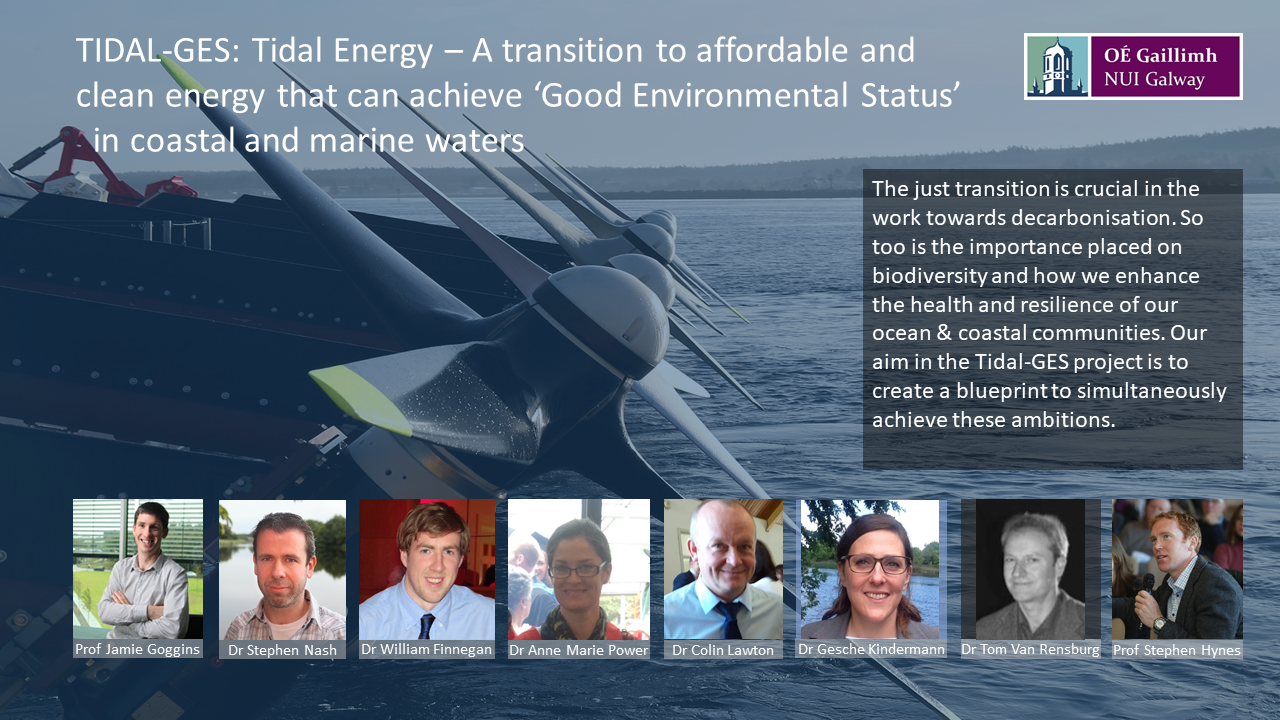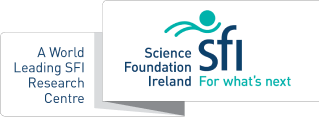
5 PhD Research Positions: Tidal Energy
A transition to affordable and clean energy that can achieve ‘Good Environmental Status’ in coastal and marine waters (TIDAL-GES)
Applications are invited from suitably qualified candidates for 5 full-time four-year PhD research positions available on TIDAL-GES at the National University of Ireland, Galway. The positions will be based in various schools at the National University of Ireland Galway and are available from 1 September 2022, where the student will enrol on the structured PhD programme.
The Tidal Energy project ‘TIDAL-GES‘ at NUI Galway is focusing on solutions to secure transition to affordable and clean energy that also enhances the health and resilience of communities, wildlife and environment. The project will engage with multiple stakeholders – including the people living in the coastal communities – to unlock the potential benefits for them in our drive to decarbonise the economy. As part of the NUI Galway Global Challenges Programme, the project will bring together a multi-disciplinary team of researchers and a wide variety of stakeholders
PhD Position 1
Supervisor: Dr Stephen Nash
This PhD will use existing datasets and coastal hydrodynamic modelling to investigate the effects of climate change on tidal resource characteristics and on hydrodynamic loading of turbine blades. The successful candidate will conduct the following:
1. Use existing future climate ocean datasets to determine likely future impacts on tidal resources
2. Develop local scale coupled tide/wave models of two study sites
3. Use future climate sea states to drive the local-scale models and investigate the effects of climate change on the tidal energy resource and device loading.
4. Use the results of the research to inform the future-proof design of turbine blades.
PhD Position 2
Supervisors: Dr Anne Marie Power & Dr Colin Lawton
This PhD will develop monitoring systems for pelagic wildlife (whales and dolphins, seals, fish, seabirds and large invertebrates such as squid) near Tidal Energy Devices. These monitoring systems will be suitable for low light, high turbidity and low visibility conditions, which tend to prevail in Irish waters. Both visual and acoustic methods are likely to be included. Artificial intelligence (AI) methods to reduce analysis time for footage will also be scoped and developed.
PhD Position 3
Supervisors: Dr Thomas Van Rensburg and Prof Stephen Hynes
This PhD aims to evaluate the economic, societal and environmental impact of tidal energy developments on relevant stakeholders using attitudinal survey and environmental valuation techniques. It will use stated preference valuation methods and deliberative/participatory valuation methods to understand and document use and non-use values and environmental externalities of tidal developments. It also aims to inform the development of future policies, planning and regulation concerned with tidal energy development. The successful candidate will conduct the following:
1. Design choice experiment attitudinal surveys for public and industry stakeholders
2. Conduct focus group research and analysis of relevant stakeholders
3. Analyse survey data using the relevant discrete choice modelling techniques Collaborate with colleagues for data collection and modelling
4. Assist in the preparation of periodic and final reports of findings.
PhD Position 4
Supervisor: Dr Gesche Kindermann
The successful candidate will conduct the following:
1. Review environmental impacts and conservation management concerns relating to tidal energy developments
2. Conduct interviews and participatory research and analysis of relevant stakeholders
3. Design and implement surveys for relevant stakeholders
4. Analyse qualitative and quantitative Collaborate with relevant project partners for data collection and analysis
5. Prepare periodic and final reports of findings.
PhD Position 5
Supervisors: Dr William Finnegan & Prof Jamie Goggins
The successful candidate will conduct the following:
1. Develop a new methodology for predicting remaining fatigue life and residual strength of tidal turbines blades periodically until their end-of-life using BladeComp
2. Develop vulnerability curves relating to the remaining structural life of the blades
3. Validate the accuracy of the new methodology using existing structural testing datasets
4. Design, develop and test a new tidal blade design for further validation of the BladeComp software
5. Advance the modules in BladeComp and make available to the public through the NUI Galway website
In addition to the specific tasks for each position listed above, the successful candidates will:
1. Prepare abstracts, journal articles, policy briefs and presentations for dissemination of the work in high-impact, peer-reviewed journals, international conferences and relevant symposia.
2. Assist in the operation of the research group by helping with the following: (i) day-to-day management, (ii) liaison with partners and NUI Galway staff as required and (iii) writing research funding applications.
3. Work independently to ensure the successful completion of the work and their development as an academic researcher.
Criteria
A first-class honours degree (or equivalent) in a relevant area, such as engineering (mechanical, civil, structural, energy systems, ocean), environmental science, Economics/Environmental/Agricultural Economics, marine ecology, or a similar discipline.
· A Masters degree in a related area is desirable,but not required (Note: for PhD 3 a Masters degree is required)
· Excellent communication, organisation and interpersonal skills, including the ability to write concise, readable reports, and the ability to interact with other researchers
· A record of peer-reviewed journal publications is advantageous,but not essential
· Applicants whose first language is not English must show evidence of English proficiency;please check requirements at: http://www.nuigalway.ie/international-students/studyinireland/entryrequirements/
· Full clean driver’s license (must be recognised in Ireland) is advantageous but not essential, apart from PhD_Position2,where this is essential
· A mix of computational modelling, programming, simulation, and data/statistical analysis skills is advantageous,but not essential, for PhD_Position1 and PhD_Position2. In particular for PhD_Position1, experience with coastal hydrodynamic models would be highly advantageous.
· Good field skills, population abundance techniques and data handling techniques are essential for PhD_Position2, while remote sensing, especially in cetacean acoustics, and GIS would be highly advantageous
· Strong econometric skills and have proven experience in the use of econometric modelling software,e.g., Stata, Excel, NGene, NLogit, is advantageous,but not essential, for PhD_Position3
· Knowledge of environmental legislation and impact assessment requirements in the European context, the ability to design and implement stakeholder surveys, and to conduct interviews and participatory research involving multi-stakeholder groups is advantageous,but not essential, for PhD_Position4
· Some prior experience in fibre reinforced composite structures is advantageous,but not essential, for PhD_Position5
The closing date for applications is Monday 9th May 2022, with interviews taking place shortly thereafter.
It is expected that the candidate will start as soon as possible after 1st September 2022.



